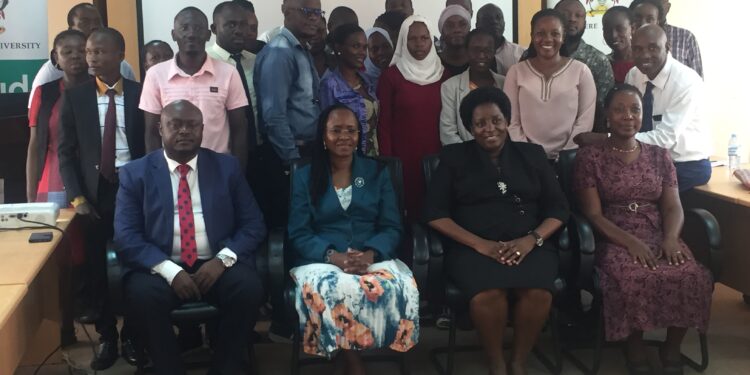Makerere University under the College Of Humanities and Social Sciences on Thursday released a groundbreaking research report calling upon the government to bolster Business, Technical, Vocational Education and Training (BTVET) programs to ensure they are inclusive, equitable, and aligned with the diverse needs of Uganda’s youth.
The study, carried out in five districts including Moroto, Kamuli, Tororo, Masaka and Kasese seeks to offer an examination of gender dynamics to understand what influences the interest of boys and girls, in joining Business, Technical, Vocational Education and Training (BTVET) courses. It highlighted patterns in BTVET enrollment, in Uganda.
According to the report, despite the presence of BTVET institutions across these regions, the enrollment rates are alarmingly low. Furthermore, among the few students who do enrol, a significant majority suffer from low self-esteem, often feeling stigmatized as failures in society simply because they chose to pursue BTVET education.
While presenting the findings, Dr Evelyn Lutwama Rukundo one of the Co-researchers, revealed that some of the youth are simply not interested in technical jobs but want white-collar jobs; and institutional factors such as poor infrastructure and limited practical materials do not attract students to BTVET institutions nor do they encourage parents to send their children to these institutions.
The research went and showed that 55.7 of the females interviewed were not in BTVET and 53.51 of the males were not. “There are many reasons concerning that and one of the main ones that we came across in Masaka is, that there is a competition between training in a BTVET institution and training in a business setting, forexample when we talked to people within the community they tried to compare the skills a young person gets from BTVET to let say one who has gone to a typical garage setting to get hands-on learning, the same applied to saloon or hairdressing if one sent their young person into a saloon compared to if one sent their young person into a BTVET institution, how would the workout? This kind of perception often determines,” said Dr Lutwama.
Gender Disparities in Skill Training
The report highlights distinct gender trends in vocational interests, with males typically gravitating towards engineering, carpentry, and electronics, while females predominantly pursue hairdressing and fashion design. However, it notes a promising shift with more females entering traditionally male-dominated fields such as plumbing.
For example, in Kasese and Moroto, more females have joined plumbing than males and this was due to the encouragement and inspiration they got from the community leaders. In Kasese, the inspector of vocational institutional was a lady at the district level, then the head of the western region of National Water was also a lady stationed in Kasese. So they kept on talking about how plumbing is good on radios even when they visited secondary schools. The fact that they were women girls admired them and joined the plumbing and she has given more opportunities for internships to females,” said one of the co-researchers.
Dr Lutwama revealed that there is an advocacy for gender equality but the stereotype in terms of acquiring skills is still so strong, In the research conducted it was discovered that in all districts, males joined courses like carpentry, brick making, building and concrete practice, Auto motor mechanics, electrician, metal fabrication, however, few males were in courses like hairdressing, nursery teaching, tailoring and hotel and catering.
“The same happened to the female students, in all the districts majority of them were in tailoring, hairdressing, and Hotel and Catering but we have found that slowly and gradually young people are shifting these mindsets. We now see men also crossing into feminine careers like hairdressers, this is a very critical benefit we can achieve from BITVET training,” she said.
A significant focus of the research was on the challenges faced by students with disabilities. The report reveals that government institutions often lack adequate learning equipment, and many private institutions struggle financially to provide the necessary tools. Despite these obstacles, some institutions like the Benedictine Technical and Production Institutes in Tororo are setting a commendable example by offering wheelchairs and special trainers and installing ramps to facilitate classroom access.
On the issue of the quality of education offered at the BIVET institutions, the study identified negative factors that influence the uptake of BTVET programmes. include such not having minimum qualifications to join the institutions; the cost of school fees, BTVET is an expensive endeavour; limited accommodation for the learners; loss of one or both parents means less income to spend on a girl’s education.
The study revealed that many existing BTVET institutions suffer from a shortage of qualified tutors and outdated equipment. This situation often results in the graduation of students who are not fully skilled, contributing to the perception among parents that their children would be better off learning business skills (In motor garages or Saloons) that are more aligned with current technologies and equipment available outside of BTVET institutes.
The report called on the government to: Increase funding for BTVET institutions. Provide essential training equipment to prevent programs from being overly theoretical. Offer start-up capital for graduates, potentially through loans. Address gender stereotypes and biases in program offerings. Combat negative perceptions and attitudes towards female participants and Enhance support for differently-abled students by providing necessary equipment.
The Principal of the College Of Humanities and Social Sciences Prof Helen Nambalirwa Nkabal welcomed the research and alluded that the output of the research is a clear way of informing the government on what policies must be formed in order for the country to move forward.
“In my capacity as a principal of the college, the moment we have such an output we are very sure that the country is on steady progress. The government of Uganda is now deliberate with research. As we are aware that the university is research-led, please make sure that you dont leave the findings on the Shelf, let’s have the books, and publish them this is how we shall grow up as an institution and as a country,” she said.
Meanwhile, this research was led by Pro Consolata Kabonesa and was funded by the Government of the Republic of Uganda Through the Makerere University Research and Innovation Fund (MAK-RIF).
Do you have a story in your community or an opinion to share with us: Email us at editorial@watchdoguganda.com














